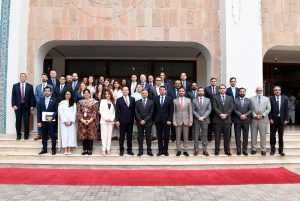In August, the United States listed the Baloch Liberation Army (BLA) and its suicide unit, the Majeed Brigade, as Foreign Terrorist Organizations (FTOs). The development marked a major milestone in the China-Pakistan joint efforts to fight the terror group.
The BLA was already on the U.S. list of Specially Designated Terrorist Groups (SDTG). Following their FTO listing, the BLA and the Majeed Brigade face asset freezes, travel restrictions, and potential curbs on material support. This will undercut their ability to raise funds.
The U.S. statement that put the BLA on the FTO list mentioned three terrorist attacks carried out by the group. Significantly, two of these — the October 2024 Karachi Airport bombing and the March 2024 Gwadar Port Authority Complex assault — were related to China. Arguably, Washington is sending a signal of counterterrorism cooperation to Beijing via Islamabad.
At any rate, the BLA’s FTO listing underscores the alignment of Pakistan-U.S. security interests in the region, paving the way for enhanced counterterrorism cooperation through intelligence sharing and operational coordination.
The development has four important counterterrorism and geopolitical implications.
First, by highlighting two of the BLA’s anti-China attacks, Washington is signaling to Beijing it is willing to take a joint approach against terrorist groups, despite their geopolitical tussle. There is a precedent for this kind of cooperation in the recent past. Despite its rivalry with Iran and Russia, the U.S. forewarned them through intelligence sharing about the Kerman and the Crocus City Hall attacks. However, due to deep-seated mistrust of the United States, Russia and Iran ignored these intelligence alerts to their own peril.
At any rate, the U.S. is impressing upon China the need for big powers to manage their geopolitical differences in a manner that does not allow terrorist groups like the BLA, the Majeed Brigade, and the Islamic State of Khorasan Province (ISKP), among others, to exploit their differences and promote their political and ideological interests.
Over the last few months, the relocation of some East Turkestan Islamic Movement (ETIM) and Central Asian terrorists to Afghanistan from Syria following Hayat Tahrir al-Sham’s (HTS) takeover is a concerning development. The battle-hardened ETIM terrorists will help in reviving the legacy group in Afghanistan under the Taliban’s umbrella, further complicating the already complex regional militant landscape and counterterrorism challenges. According to The Economist, the Uyghur militants in Syria already pose an imminent threat to China.
U.N. reports have indicated that in the past, some overenthusiastic Uyghur terrorists, frustrated by the Taliban’s restrictions on them imposed under China’s pressure, joined ISKP. Currently, ISKP is going through a rough patch following arrests of several key leaders, Euro Pol’s crackdown against its online propaganda channels, and disruption of its financial networks in Somalia and Turkiye. The relocation of ETIM and Central Asian terrorists could help ISKP’s declining fortunes.
Therefore, it is crucial to put ETIM on the FTO list as well. This will help the United States win China’s cooperation on counterterrorism against common threats. It would also deny terrorist groups like the BLA, the Majeed Brigade, ISKP, and ETIM use of Afghanistan as a base to undermine regional and global peace.
Second, after the BLA and the Majeed Brigade’s FTO designation, Pakistan will find it less challenging to get the support of U.S.-based social media companies to suspend social media pages, channels, and accounts associated with the two groups. In the past, such accounts, despite promoting the BLA and Majeed Brigade’s violent propaganda, were not removed, to the Pakistani government’s frustration, due to the absence of the FTO designation. Now that both groups are on the FTO list, under U.S. laws, social media companies like Meta will be more forthcoming and cooperative in rolling back their digital footprints.
Concurrently, Pakistani authorities should also share evidence of the BLA’s terrorist activities with encrypted apps like Telegram and Signal from the Shanghai Cooperation Organization (SCO)’s platform to build pressure on them to suspend accounts and channels promoting their propaganda.
Third, certain sections of the Baloch diasporic community living in the West and Gulf countries have been glorifying and amplifying the BLA and Majeed Brigade’s narrative and have acted as their virtual mouthpieces. After the FTO listing, it will become challenging for them to continue posting pro-BLA content, as their social media accounts could be banned or suspended. Although the BLA’s propaganda will not totally disappear from open social media platforms like X, Facebook, Instagram, YouTube, and TikTok, it would become less widespread.
Finally, the FTO designation will create financial challenges for the BLA and the Majeed Brigade. By cutting access to international financial networks, the two organizations’ ability to raise funds internationally, procure weapons, and run violent operations in Balochistan will be hampered. The BLA and the Majeed Brigade’s attacks against the China-Pakistan Economic Corridor (CPEC) projects in Balochistan undermined development. Violence and unrest in the province have slowed progress on several development projects while increasing the security costs.
The scourge of terrorism, notwithstanding its forms and manifestations, should not be allowed to undermine global peace and security. Though terrorism is not the main concern on the global priority list, it remains a potent common threat, which major global powers like the U.S. and China, together with regional states, such as Pakistan, should fight jointly and comprehensively.
The U.S. signal to China for possible counterterrorism cooperation by placing the BLA and the Majeed Brigade on the FTO list is a welcome step. It provides insights into a possible global counterterrorism framework in the era of great power competition.

































